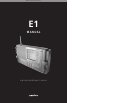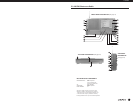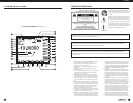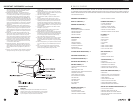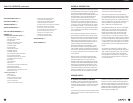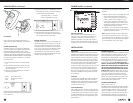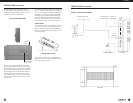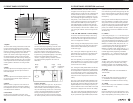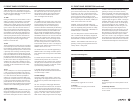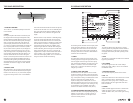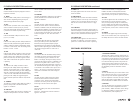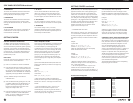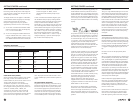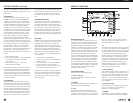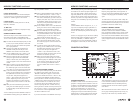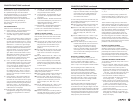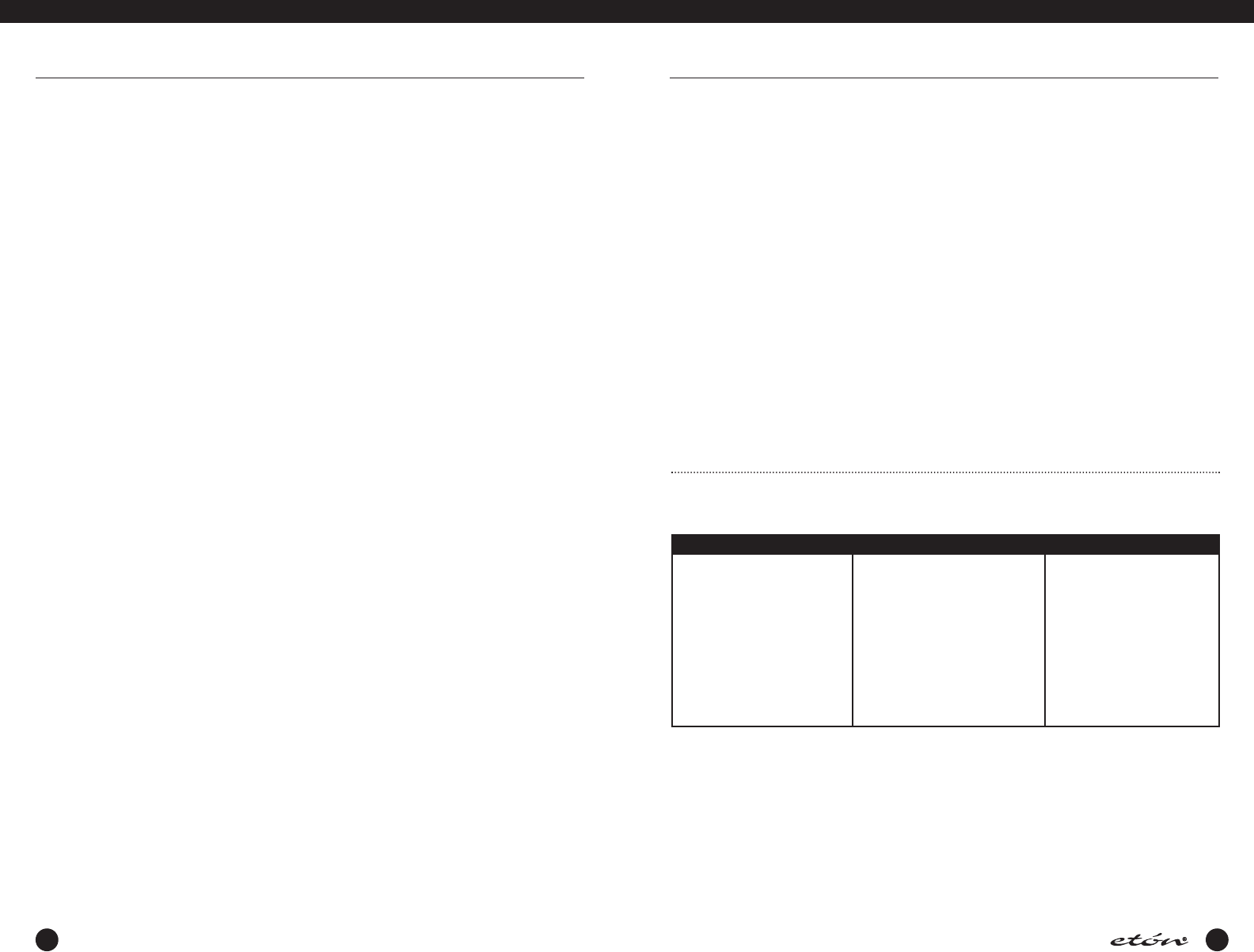
14 15
will be active. Pressing this softkey a second time tog-
gles to theAUX function which causes the softkey label
to appear as “ FM / AUX ”.The AUX function allows
stereo audio fed into the LINE IN connector on the side
panel to be fed to the internal speaker or to head-
phones plugged into the stereo headphone jack, which
is also on the side panel.The ‘VOLUME’,‘TREBLE’, and
‘BASS’ controls will be active in this mode.
SW BAND - Pressing the ‘SW BAND’ softkey once
enables the shortwave band (1.800 - 30.000 MHz).The
MW / LW - Repeatedly pressing the ‘MW / LW’ softkey
toggles between the LW band (100 - 499.99 kHz) and
the MW band (500 - 1799.99 kHz).
VFO - This softkey returns to theVFO mode from MEM-
ORY or COUNTRY modes.The frequency displayed will
be the same as the frequency last selected in VFO mode
before MEMORY or COUNTRY modes were selected.
MEMORY - Selects MEMORY mode which allows pro-
gramming or listening to the programmed contents of
memory channels 1 through 500.
E1 FRONT PANEL DESCRIPTION continued
E
1 MANUAL
Low High FreqBand
120Meter
90 Meter
75 Meter
60 Meter
49 Meter
41 Meter
31 Meter
25 Meter
22 Meter
19 Meter
16 Meter
13 Meter
11 Meter
2300 kHz
3200 kHz
3900 kHz
4750 kHz
5800 kHz
7100 kHz
9500 kHz
11,600 kHz
13,570 kHz
15,100 kHz
17,480 kHz
21,450 kHz
25,600 kHz
2500 kHz
3400 kHz
4000 kHz
5060 kHz
6200 kHz
7600 kHz
9900 kHz
12,100 kHz
13,870 kHz
15,800 kHz
17,900 kHz
21,850 kHz
26,100 kHz
Shortwave Band Designators
20. POWER
Pressing this key toggles the unit on and off.
21. Display
This is a dot matrix LCD display. See the DISPLAY
description for details.
22. Speaker
This is the opening for the internal speaker for the E1
receiver.
23. Telescopic Antenna
This is a 39 1/4“ (1.003 meters) telescopic antenna for
use on all bands.
COUNTRY - Selects COUNTRY mode which allows pro-
gramming or listening to the contents of memory
channels 501 through 1700.These 1200 memory chan-
nels are divided among 111 countries from Afghanistan
to Yugoslavia with 10 memory channels per country, and
with 90 memory channels remaining with no country
assigned. Display will appear as “BAND ”. Pressing the
‘SW BAND’ softkey again once SW has been selected
will cause the ‘--’ portion of “SW -- M” on the display
to flash and the display will show “ SW BAND ” for
approximately SW BAND 2 seconds. During this 2 sec-
ond interval, entering the meter designator for the
desired meter band will cause the receiver to go to the
low end of the frequency range for the desired meter
band. During this 2 second interval one can also scroll
through the available SW bands using the ‘TUNING’
knob or the ‘< SELECT >’ key. Each keypress or TUNING
input resets the two second timer.The frequency ranges
for the defined meter shortwave bands are as shown in
the ‘Shortwave Band Designators’ table which follows.
E1 FRONT PANEL DESCRIPTION continued
“RADIO SETTINGS” menu, and 200 kHz steps on FM
mode, until a signal is encountered that is stronger than
the SQUELCH setting. While SEEK is engaged, the word
“SEEK” will appear on the display.
14.TIME
Pressing the ‘TIME’ key will cause the TIMER 1 screen to
appear on the display, allowingTIMER 1 to be enabled
or disabled. Pressing it a second time will cause the
TIMER 2 screen to appear, allowing it also to be enabled
or disabled. Pressing the TIME key the third time brings
up the “CLOCKS” menu which will allow selection of
GMT or LOCAL time for the time display. Pressing the
‘TIME’ key the fourth time will return the display to the
VFO, MEMORY or COUNTRY screens, depending upon
which of these screens was being displayed when the
‘TIME’ key was pressed the first time.The receiver dis-
plays the time when in the off mode, and when in this
state, pressing the ‘TIME’ key will toggle the displa
between Local and GMT time.
15. PBT
The PBT (PassBandTuning) knob varies the IF passband
of the receiver plus or minus 2 kHz relative to the detec-
tor beat frequency oscillator (BFO) in SSB mode, and rel-
ative to the displayed frequency when on AM mode.This
is particularly useful in reducing or eliminating interfer-
ence to the desired signal from nearby signals.The PBT
knob will be ineffective unless the ‘PBT’ softkey beneath
the display is pressed.The amount of IF frequency dis-
placement from nominal will be displayed directly above
the ‘PBT’ function label on the display. PBT tuning is not
available in FM or AUX modes. In MEMORY or COUN-
TRY modes, the stored PBT value will always be recalled
and “MEM” will be indicated above the ‘PBT’ softkey
until changed.
16. DX
The ‘DX’ softkey turns on or off an RF preamplifier which
is useful in improving the readability of very weak sig-
nals, especially when using the built in telescopic anten-
na or other short antennas. When the preamplifier is
enabled,“DX” will appear on the display. When using
long antennas or when the receiver is in close proximity
to very strong broadcast transmitters, the receiver will
perform best with ‘DX’ off.The DX function is not avail-
able inAUX mode. Note that battery life will be reduced
somewhat if DX is enabled during portable operation.
17. FAST / TUNING LOCK
Repeatedly pressing the FAST / TUNING LOCK key cycles
through the available tuning rates for the current oper-
ating mode, as explained in more detail under “Tuning”
which follows. Holding down the ‘FAST / TUNING LOCK’
key for approximately 2 seconds will lock out the ‘TUN-
ING’ knob and will cause “TUN LOCK” appear on the
display. Depressing the key again for approximately 2
seconds will unlock the ‘TUNING’ knob and “TUN
LOCK” will disappear from the display.
18.Tuning
The 'TUNING' knob is the primary tuning control of the
E1 receiver. In VFO mode, clockwise rotation of the dial
increases frequency and counterclockwise rotation
decreases frequency.The rate at which frequency is
increased or decreased is determined by the band being
tuned and by pressing the ‘FAST/TUNING LOCK’ key on
a given band. In VFO mode, the ‘FAST/TUNING LOCK’
key also changes the displayed frequency resolution. In
MEMORY mode, the ‘TUNING’ knob scrolls through the
500 MEMORY channels one at a time. If the ‘FAST/TUN-
ING LOCK’ key is pressed, “FAST” appears on the dis-
play and the ‘TUNING’ control scrolls through the 500
MEMORY channels 10 at a time as long as the ‘TUN-
ING’ knob is being turned. If the ‘TUNING’ knob is not
moved for three seconds, the “FAST” on the display will
disappear and the ‘TUNING’ knob will revert to tuning
MEMORY channels one at a time.
The ‘TUNING’ knob is also used when programming in
MEMORY mode to scroll through all available alphanu-
meric characters when entering names for each MEMO-
RY entry.
In COUNTRY mode, the ‘TUNING’ knob scrolls through
COUNTRY memory channels one at a time. If the
‘FAST/TUNING LOCK’ key is pressed, “FAST” appears on
the display and the ‘TUNING’ knob scrolls through the
available countries one country at a time with 10 mem-
ory channels being available per country.
In SW BAND mode, the ‘TUNING’ control will scroll
through the available shortwave broadcast bands from
120 meters through 11 meters.
19. Mode Softkeys
The purpose of each of these softkeys is shown along
the right edge of the display when the receiver is in the
ON state. From top to bottom their descriptions are as
follows:
FM / AUX - Pressing this softkey toggles between the
FM broadcast band and the AUX function.The selected
function will be in reverse video.The first press of this
softkey selects the FM broadcast band (76.0 - 90.0 MHz
or 87.0 -108.0 MHz) and causes the label for this key to
appear as “ FM / AUX ”.When in FM mode, only the
MENU function softkey along the bottom of the display



